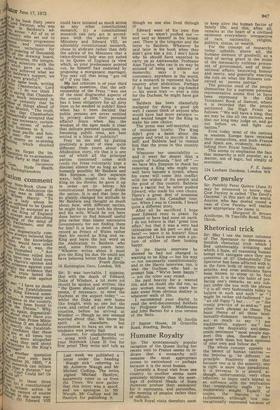Humane Royalty
Sir: The spontaneously popular reception of the Queen during her recent visit to France seems to indicate that a monarchy still remains the most appropriate crown to nationhood — perhaps because it is the most human. Certainly a Royal visit from one country to another seems more genuinely intimate than the meetings of political Heads of State (however profuse their embraces) for it represents, and personifies, the meeting of peoples rather than of officials.
Such Royal visits therefore seem
to keep alive the human factor of family life; and this, after all, remains at the heart of a civilised existence everywhere: irrespective of race, nationality, religion, politics, status, or wealth. For the concept of monarchy today upholds, above all, the humane element of goodwill; as a kind of saving grace in the midst of the necessarily ruthless processes of government, and of international affairs: bestowing honour and mercy, and generally enacting the role on what the Romans conceived as parens patriae.' The genuine need of the people themselves for a supreme personal representative seems first to have been expressed in the Old Testament Book of Samuel, whereit is recorded that the people petitioned the High Priest as follows: "We will have a king, that we may be like all the nations, and that our king may judge us, and go out before us, and fight our battles." Even today most of the nations in western Europe have retained their monarchies, and both France and Spain are, evidently, re-establishing their Royal families. This seems to emphasise the fact that monarchy is still popular, as a matter, not of logic, but simply of sentiment.
F. E. Isaac 124 Lexham Gardens, London W8










































 Previous page
Previous page